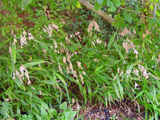Native Plants

Q. Who is Mr. Smarty Plants?
A: There are those who suspect Wildflower Center volunteers are the culpable and capable culprits. Yet, others think staff members play some, albeit small, role. You can torture us with your plant questions, but we will never reveal the Green Guru's secret identity.
Did you know you can access the Native Plant Information Network with your web-enabled smartphone?
Ask Mr. Smarty Plants is a free service provided by the staff and volunteers at the Lady Bird Johnson Wildflower Center.

rate this answer
Sunday - June 28, 2009
From: Pittsburgh, PA
Region: Mid-Atlantic
Topic: Deer Resistant
Title: Deer resistant plants for erosion control on steep hill
Answered by: Nan Hampton
QUESTION:
I would like control a steep hill behind my house that is red clay, northern exposure with little sun. What plants would you recommend that deer will not eat?ANSWER:
Grasses are ideal for erosion control because of their extensive fibrous root systems. Additionally, deer rarely eat grasses. Below are grasses native to Pennsylvania that will grow in clay soils in part shade (2 to 6 hours of sun per day).Bouteloua curtipendula (sideoats grama)
Chasmanthium latifolium (Inland sea oats)
Elymus canadensis (Canada wildrye)
Schizachyrium scoparium (little bluestem)
Deer also rarely eat ferns and ferns are ideally suited for shady sites. Here are a few that are native to Pennsylvania.
Osmunda cinnamomea (cinnamon fern)
Pteridium aquilinum (western brackenfern)
Woodwardia areolata (netted chainfern)
Here are other plants that you could add to the grass or fern mix that are native to Pennsylvania and deer resistant.
Amorpha fruticosa (desert false indigo)
Asclepias tuberosa (butterfly milkweed)
Monarda fistulosa (wild bergamot)
Oenothera speciosa (pinkladies)
Ratibida columnifera (upright prairie coneflower)
Phyla nodiflora (turkey tangle fogfruit)
Solidago nemoralis (gray goldenrod)
More Deer Resistant Questions
Specifications for a property in Corning CA
March 29, 2012 - Drought resistant, deer resistant, low growing (ground cover), and shade tolerant request:
I am looking for a variety of species that not only fit the above preferences, but also a few other things. ...
view the full question and answer
Deer resistant vines for trellis
December 07, 2009 - We would love to have a blooming vine on our trellis, but the deer devour ever attempt. Please recommend something!
Thank you.
view the full question and answer
Deer resistant trees and shrubs for PA
May 05, 2011 - My yard backs up to woods, and we have a herd of 12 deer who peruse the neighborhood. This winter, the deer went after bushes and trees that they previously have not touched: euonomous and leyland cyp...
view the full question and answer
Lily plants being chewed from Austin
June 20, 2013 - Something is chewing my lily plants to the ground. Any ideas what and do I stop them?
view the full question and answer
Deer-resistant groundcover for New Braunfels, TX
September 24, 2011 - Could you recommend some deer resistant ground cover plants for the New Braunfels area? We have tried Ajuga and Katie's Ruellia and they have been eaten.
view the full question and answer
| Support the Wildflower Center by Donating Online or Becoming a Member today. |

